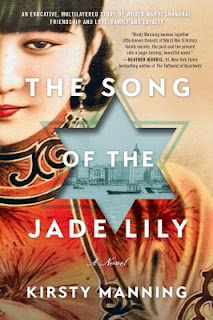The Song of the Jade Lily by Kirsty Manning
At a time when no other country, including US, UK, Australia, would open its doors to Jews fleeing the concentration camps, Shanghai had opened its doors to more than twenty thousand refugees fleeing Europe during WWII. “It was possible before 1940 to be released from a concentration camp if you had a valid passport, visa, permit to take up residency in another country, and proof of transport. Such release was always subject to the prisoner leaving Germany within a limited time.”
Vienna, Nov. 1938: Young Romy can’t understand why Jews are so hated. “The synagogue’s library of rare books and manuscripts lay in a pile of smoldering cinders on the footpath.”
Not able to obtain visas, her family is left with only one option where visas are not needed – Shanghai.
In Shanghai, International Committee set up boarding houses for the Jewish refugees. The area is safe for Jews, but relations between Chinese and Japanese have been strained since 1931.
As welcoming as Shanghai felt when Romy arrived there with her family, now it feels as bad as Vienna. The relations between Chinese and Japanese become even more worried. Romy’s family is forced to move to a ghetto. She watches her friends disappear. First Vienna, now Shanghai unwelcomes them.
2016: Alexandra returns to Australia to be with her grandparents, Romy and Wilhelm. Her grandpa is dying and he mentions a name Li. Alexandra has never heard either of her grandparents mention a Li. Then he mentions Shanghai and three of them. Alexandra wonders if he is lucid, because none of it makes sense.
While in Shanghai on her new posting, Alexandra uses her free time to research her Chinese heritage as her grandparents never wanted to talk about their adopted Chinese daughter.
This multilayered story skillfully reveals the past story of WWII Shanghai and the present day Shanghai characterized by its gardens and laneways full of sizzling dumplings and noodles; weaving into it love that matures with each challenge and friendship that deepens with each step. All this tested by the power of war and how hardship and courage can shape a person. The author vividly captures the feel of the era.
This book was read by experts for historical credibility and accuracy of traditional Chinese medicine; and also by those who lived in Shanghai during the Occupation and migrated to Australia afterward.
Release date: 14 May 2019
Source: William Morrow
Vienna, Nov. 1938: Young Romy can’t understand why Jews are so hated. “The synagogue’s library of rare books and manuscripts lay in a pile of smoldering cinders on the footpath.”
Not able to obtain visas, her family is left with only one option where visas are not needed – Shanghai.
In Shanghai, International Committee set up boarding houses for the Jewish refugees. The area is safe for Jews, but relations between Chinese and Japanese have been strained since 1931.
As welcoming as Shanghai felt when Romy arrived there with her family, now it feels as bad as Vienna. The relations between Chinese and Japanese become even more worried. Romy’s family is forced to move to a ghetto. She watches her friends disappear. First Vienna, now Shanghai unwelcomes them.
2016: Alexandra returns to Australia to be with her grandparents, Romy and Wilhelm. Her grandpa is dying and he mentions a name Li. Alexandra has never heard either of her grandparents mention a Li. Then he mentions Shanghai and three of them. Alexandra wonders if he is lucid, because none of it makes sense.
While in Shanghai on her new posting, Alexandra uses her free time to research her Chinese heritage as her grandparents never wanted to talk about their adopted Chinese daughter.
This multilayered story skillfully reveals the past story of WWII Shanghai and the present day Shanghai characterized by its gardens and laneways full of sizzling dumplings and noodles; weaving into it love that matures with each challenge and friendship that deepens with each step. All this tested by the power of war and how hardship and courage can shape a person. The author vividly captures the feel of the era.
This book was read by experts for historical credibility and accuracy of traditional Chinese medicine; and also by those who lived in Shanghai during the Occupation and migrated to Australia afterward.
Release date: 14 May 2019
Source: William Morrow

Comments
Post a Comment